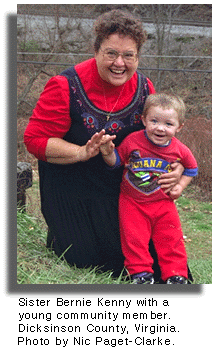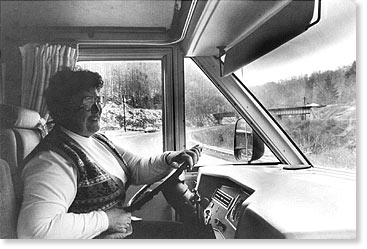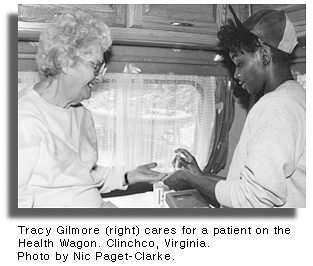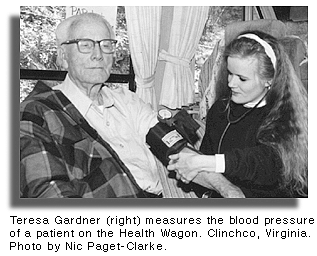|
The Health Wagon
in the Appalachian Mountains Appalachians take care of their own An Interview with Sister Bernie Kenny Dickinson County, Virginia Introduction
Sister Bernie: Yes, it's a 35% increase. Anyway, for example, if you keep taking your insulin, you won't end up with your leg off like that man over there. His diet just wasn't controlled. That's why we have him in the group. Socializing is so important. In Motion Magazine: Is diabetes a big problem in Appalachia? Sister Bernie: Yes, because we use a lot of bread and starches in the low-income diet of this area In Motion Magazine: How many years has the healthcare preventive program program been in effect? Sister Bernie: Since 1985. We've had the best success rate with our smoking cessation. In Motion Magazine: I've noticed people do smoke a lot around here.
Another example of preventive care is our efforts against infant mortality. By us offering free pregnancy testing, we get into care earlier, provide better nutrition and a healthier baby. The infant mortality rate has come down two points in the last four years which is really considerable. In Motion Magazine: How are you funded? Sister Bernie: We write grants. We get funding from the church by personal appeals. In Motion Magazine: You don't get grants from the church?Sister Bernie: No. Grants from health care corporations, for example St. Joseph's Hospital in Orange, California. In Motion Magazine: It must be difficult to never really know when or if the next grant is coming. Sister Bernie: We just keep scrambling. One grant that's Teresa was on finished in June, but we received word of another two-year grant, so we're sure for two years. In Motion Magazine: So at least you're not at the whim of Mr. Gingrich. Sister Bernie: No, it's totally private. We get enough from the donations of the people -- we don't charge anybody and we don't do any third-party billing. People make donations and that's enough to pay gas and repairs on the bus. In Motion Magazine: What would happen if you weren't here? Sister Bernie: A lot of things wouldn't happen. In Motion Magazine: There's just no health care? Sister Bernie: There's no care. In Motion Magazine: There's other parts of the Appalachians that don't have care? Are there others like you? -- Or do people just not have anything? Sister Bernie: A lot of people, they don't have anything. |
|||||||||||||
Published in In Motion Magazine November 16, 1997
|
|||||||||||||
If you have any thoughts on this or would like to contribute to an ongoing discussion in the  What is New? || Affirmative Action || Art Changes || Autonomy: Chiapas - California || Community Images || Education Rights || E-mail, Opinions and Discussion || En español || Essays from Ireland || Global Eyes || Healthcare || Human Rights/Civil Rights || Piri Thomas || Photo of the Week || QA: Interviews || Region || Rural America || Search || Donate || To be notified of new articles || Survey || In Motion Magazine's Store || In Motion Magazine Staff || In Unity Book of Photos || Links Around The World NPC Productions Copyright © 1995-2020 NPC Productions as a compilation. All Rights Reserved. |
|||||||||||||


 Deep in the Appalachian Mountains of western Virginia, generations of miners and their families live in narrow hollers between beautiful tree-covered hills and mountains. Towns are often only four or five blocks long, and one block wide. Between the steep sides of the valleys flow rivers, winding roads, and train tracks travelled by load after load of coal.
Deep in the Appalachian Mountains of western Virginia, generations of miners and their families live in narrow hollers between beautiful tree-covered hills and mountains. Towns are often only four or five blocks long, and one block wide. Between the steep sides of the valleys flow rivers, winding roads, and train tracks travelled by load after load of coal.

